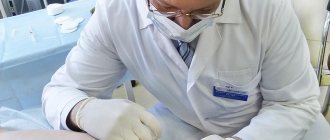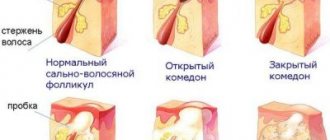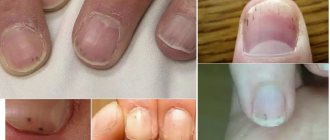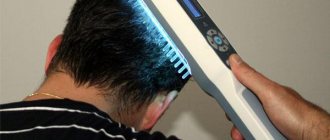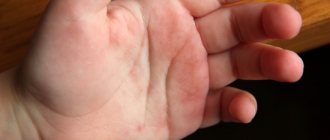Men sometimes experience redness and itching of the scrotum.
Many factors contribute to this.
Itching is a symptom of many diseases.
In today's article we will talk about the causes and consequences that can lead to itching under the scrotum.
The mechanism for the occurrence of redness is that an abundant supply of blood enters the skin of the scrotum and testicles, as a result of which it turns red.
Blood flow, in addition to the scrotum and testicles, can also flow abundantly into the epididymis and spermatic cords.
In many cases, this is evidence that an inflammatory process has begun.
There are several reasons for the occurrence of such hyperemia.
Their elimination is aimed at destroying pathogenetic factors and reducing the inflammatory process:
- Infectious inflammation as a result of the activity of various pathogenic microorganisms. They can develop throughout the entire structure of the scrotum, testicles, epididymis, seminal canals, as a result of which the body begins a protective reaction to this process and the occurrence of severe itching of the scrotum and the occurrence of hyperemia.
- The causes of inflammation of the scrotum can also be non-infectious.
- Reduced blood flow from the testicles themselves, due to scrolling of the seminiferous ducts, which contain nerve fibers and small blood vessels.
If we talk about the infectious appearance of scrotal hyperemia, it is caused by several groups of bacteria.
They cause both itching of the scrotum itself and its hyperemia.
A nonspecific bacterial infection can be represented by the following pathogenic microorganisms:
- staphylococcus
- Escherichia coli and Pseudomonas aeruginosa
- streptococci
- even pathogens such as protea can connect
In addition to the fact that they can affect the scrotum itself and its tissues, they can also penetrate the testicles and their appendages.
They can be introduced simply through the bloodstream or through the flow of the lymph itself.
According to many doctors, these pathogens do not have a clear direction in choosing the damaged tissue and its cells.
This indicates promiscuity towards the cells they destroy.
When a man says that his scrotum itches and begins to itch, he is mostly to blame.
He immediately begins to get nervous and remembers what he did, who he slept with or didn’t sleep with.
Basically, the causes of such itching can be ordinary failure to observe personal genital hygiene.
And it’s enough just to take a shower or go to the bathroom and wash well with soap.
After this, the itching of the scrotum can be reduced or completely eliminated if this process is of a non-bacterial type, which affects much worse.
Despite all his shyness, a man should still visit the appropriate doctor.
Namely, a urologist or dermatovenerologist.
The doctor will examine the genitals for hyperemia and inflammation, both the testicles and the scrotum itself.
But many men are embarrassed by such an examination.
Despite the fact that severe itching of the scrotum begins, they remain their ground and endure what is fraught with danger for themselves.
The process can go into a chronic stage and affect much more and worse, affecting the entire body as a whole.
Moreover, any inflammatory processes can negatively affect the reproductive function of men.
Itching of the scrotum: manifestations and mechanism
Itching itself is a specific reaction of the body, which is manifested by an indefinable desire to scratch the area where pathogenic bacteria were involved.
In other words, this is an uncomfortable state that does not feel very pleasant.
Itching can appear not only on the scrotum, but also on almost any part of the body.
If we talk about the mechanism of the appearance of itching itself, then this is a specific innervation of epithelial cells.
Occurs as a result of various environmental influences or to create cell excitation (exogenous and endogenous factors).
The mechanism of itching is to produce an intense effect on the cells of the immune system and blood cells (leukocytes).
In addition to these cells, calcitonin or the main hormone produced in the thyroid gland may also be involved in the manifestation and occurrence of itching.
Itching of the penis also occurs, mainly during an infectious process (for sexually transmitted diseases, syphilis, gonorrhea, HIV infections, etc.).
The patient may notice itching in other areas, for example:
- Itching between the anus and scrotum
- Itching of the scrotum and anus
- Patients may also experience itching and burning in the scrotum itself.
- They notice itching around the scrotum itself
Men who came to see a doctor complain:
- for bloody calluses around or near the scrotum due to frequent and vigorous scratching
- on chafing from clothes that are too tight and not breathable
- for diaper rash
Why do both eggs itch?
Experienced people say that both testicles can itch due to a sudden change in weather. Moreover, the weather will only change for the worse.
- The itching is weak, barely noticeable - a little rain and a cool breeze.
- Moderate intensity - strong wind, thunderstorm.
- Very strong - stormy wind, rain and snow.
There is another, very joyful and pleasant interpretation of this sign - a baby will appear in the family. This sign is true for those who have been waiting for this joyful event for a long time.
Sometimes this sign promises climate change
Types of scrotal itching
Itching can be divided into several types:
Pruritoceptive - or itching, accompanied by inflammation, damage and dryness of the skin. It is with this type of scrotal itching that patients note severe itching and peeling of the scrotum itself.
Neuropathic – itching specific to various nervous disorders.
Neurogenic - itching is specific to various other types of disorders, but as a rule it is not of a nervous nature.
Psychogenic – itching characteristic of specific mental pathologies and disorders.
Thanks to the division into types, one can talk about pathogenic or non-pathogenic factors of itching.
If we talk about the non-pathogenic factor of itching of the scrotum, then the irritation itself that appears on the scrotum area is of a natural nature due to one or another effect.
For example, chemical, thermal, tactile, physical.
Usually goes away due to the elimination of the above reasons.
This reason is not serious and does not require a visit to a doctor's office.
A man just needs to take appropriate measures.
For example, go to the shower and do the appropriate hygiene procedures.
Genital warts5
They are easy to miss because they can be very small. The cause of genital warts is the human papillomavirus. Unlike warts on other parts of the body, these warts usually appear as small, discolored bumps that may itch, but often go unnoticed. They are often shaped like cauliflower and appear in large groups, often along with other warts. They appear directly on the penis, scrotum or quite far from them - on the inner thigh.
How to treat? Using special ointments such as Imiquimod (Aldara) and Podofilox (Condylox). In some cases, warts will have to be removed surgically by freezing them (cryotherapy) or by surgery.
Causes leading to severe itching of the scrotum and testicular area
There are many factors influencing such an unpleasant process.
Sometimes it is difficult to stop even with drugs with antihistamine effects.
Allergy
Touching the delicate skin of the genitals with poor-quality fabric of underwear, or contact with shampoo, gel, soap, little-known creams or ointments.
Sometimes behind the beautiful appearance there is hidden the treatment of linen with toxic dyes that contain large amounts of chromium.
If the underwear is made of synthetics, then this can also cause itching when worn for a long time, and leads to diaper rash in the genital area.
Many men note the occurrence of allergic itching due to the use of latex condoms.
Infections
A large number of both beneficial and pathogenic microorganisms constantly live on the surface of a man’s genitals.
If a man constantly follows the rules of personal hygiene, namely, changes his underwear daily and takes a shower, then beneficial and pathogenic microorganisms coexist peacefully.
But if a man does not follow these simple rules, then an inflammatory process may occur on the skin of the scrotum, leading to itching.
Due to damage to the delicate tissues of the skin.
Often the area where the testicles are located (the scrotum) is “attacked” by streptococcal bacteria.
Also, in addition to streptococcus, the scrotum can be “attacked” by mycoplasma and ureaplasma, and some types of fungi.
One of them is the Candida fungus (candidiasis).
It is with infectious dermatitis that a specific rash appears on the skin of the scrotum, somewhat reminiscent of a burn, the so-called urticarial rash.
If you look closely at it, it looks like a nettle burn.
Pediculosis
Despite all the observance of personal intimate hygiene, many men who are promiscuous can pick up a very unpleasant parasite.
These are pubic or body lice.
This parasitic disease is called pediculosis.
You can get infected almost anywhere:
- in public transport, when a large crowd of people is forced to come into contact with each other
- in a public bath, swimming pool, shower, sauna
- when visiting a public toilet
Itching is caused by parasite bites on the delicate skin of the genitals.
But with the bite itself, the patient does not feel pain.
The parasite's saliva contains an anesthetic substance, which it injects immediately after the bite.
Itching at the site of the bite begins only after 5 minutes.
Itching from head lice can be very painful and is accompanied by small bloody calluses after scratching.
Chlamydia
A disease of a sexually transmitted nature provokes severe itching in the area of the scrotum and testicles located in it.
Many men with chlamydia experience immediate itching in the scrotum area.
In fact, the itching is concentrated on the inner surface of the testicles, which indicates a large population of chlamydia parasites.
In addition to itching, the man also complains of pain and burning when urinating.
With timely treatment and taking appropriate medications, itching in the testicular area usually decreases or stops altogether.
Erythrasma
Occurs when the body’s immune properties decrease.
With this progression, the parasites begin to actively multiply and release their pathogenic waste into the human body.
The main characteristic symptom that appears with erythrasma is that the scrotum begins to take on the color of red brick.
Itching can move between the genital area to the anus and perineum.
The itching is not constant; it usually begins in the afternoon and intensifies in the evening.
With erythrasma, this process is specific only when the immune system is reduced, when the body is not able to resist a large number of pathogens.
Athlete's inguinal
The pathology is fungal type, the main causative agent is mycotic fungal spores.
Inguinal athlete's foot can become chronic, causing very serious consequences.
It may occur with periods of both decline and exacerbation.
Men aged 32 to 45 years are most often affected.
In addition to the itching of the testicles or scrotum, patients complain of the appearance of round spots on the genitals, somewhat reminiscent of lichen planus.
Herpetic genital infection
As you know, herpes is viral in nature.
This type of itching, known as herpetic itching, occurs due to the appearance of herpes on the genitals.
The cause of its appearance is unprotected sexual intercourse with a partner who already has such an infection.
To avoid infection, you must use a condom.
The main symptom of herpes on the genitals is the appearance of small blisters filled with a yellowish-whitish liquid.
Psoriasis
A specific autoimmune reaction of the body.
The pathogenesis of this condition has not been fully studied, and a means to completely cure this disease has not yet been found.
At the first signs of psoriasis in men, the testicles always begin to itch due to the appearance of psoriatic plaques on them.
The scrotum becomes covered with a whitish coating and peels off due to damage to the epithelial tissue.
Genital herpes3
This viral infection, spread through sex or physical contact with infected skin, causes persistent itching of the testicles, penis and the area around them. Other symptoms of the disease:
- redness with blisters appear on the penis and testicles of the groin area, which, if damaged, can turn into open, but still itchy, ulcers;
- pain when urinating (not always);
- general feeling of fatigue, malaise, low fever.
How to treat? Antiviral drugs Valaciclovir (Valtrex) or Acyclovir (Zovirax) are needed during an exacerbation. Treatment lasts about a week, but may take a long time if similar viral outbreaks occur frequently.
Treatment for itchy scrotum
If we talk about such a symptom as itching of the scrotum rationally, then it can be reduced or completely eliminated.
For example, to reduce itching, you can wash the scrotum yourself with antiseptic solutions.
Every home has them (hydrogen peroxide, furatsilin tablets or solution, miramistin, chlorhexidine).
After washing, you can use Sinaflan ointment.
It is best to rinse before going to bed.
If we talk about folk methods, then various baths made from infusions of chamomile, oregano, and sweet clover have worked well.
If you nevertheless visit a doctor, then know that he will definitely prescribe hydrocortisone ointment.
This is the most famous and proven remedy for the treatment of itching of the scrotum.
Sometimes the doctor may also prescribe antihistamines to reduce itching and pain in the testicles.
Such drugs as triderm, panthenol, nezulin, gistane very well reduce itching in the scrotum.
Such ointments and tablets made on the basis of menthol cannot be used when the patient has deeply scratched the skin and there are ulcers and bloody cobwebs.
But basically, treatment will be effective only if the diagnosis is correctly determined.
With timely administration of appropriate medications and in order to avoid various complications.
But remember, every drug has side effects.
Therefore, before taking any medications, it is necessary to consult a specialist (urologist, infectious disease specialist).
What to do from traditional methods
Traditional methods are used in the absence of diseases - mechanical irritation of the skin, sweating, violation of hygiene rules. To do this, brew herbs with antipruritic and anti-inflammatory effects. They are used for washing or sitz baths. For 1 liter of water, take 3 tablespoons of the crushed plant and keep it in a water bath for 20 minutes, filter and cool to body temperature.
The most effective are considered:
- calendula flowers, chamomile;
- succession and celandine grass;
- sage;
- St. John's wort;
- eucalyptus leaves.
The resulting decoction is used for rinsing, and when taking baths it is added to water in a ratio of 1:4.
The scrotum may itch due to irritation from clothing, after shaving, changes in blood supply, or due to ingrown hairs. This symptom occurs most often with scabies, lice infestation, fungal infection, contact dermatitis, less often, itching appears with psoriasis, tumors, varicocele. For treatment, external remedies are usually sufficient, but they are prescribed after diagnosis.



